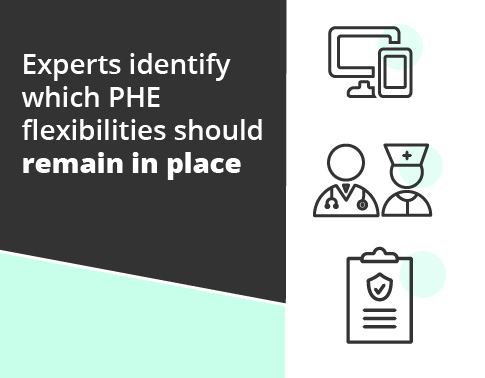Sustaining Flexibilities in Medicare and Medicaid
Federal and state governments enacted significant flexibilities during COVID-19 to ensure that Medicare and Medicaid beneficiaries could receive care in community. For example, some states allowed Medicaid to cover help at home and Medicare significantly expanded telehealth coverage.
Policymaker Roadmap
Experts developed recommendations on which Medicare and Medicaid public health emergency flexibilities should be made permanent because they increase equitable, person-centered care for older adults.
The Opportunity
In the early days of the pandemic, federal and state governments quickly implemented regulatory flexibilities through the COVID-19 Public Health Emergency (PHE) to ensure that Medicare and Medicaid beneficiaries could receive care safely and in their own community. As the country enters the endemic phase of COVID-19, many experts have found that these critical flexibilities improved older adults’ access to care, aligned with their needs and preferences, and should be made permanent.
Aim and Approach
We engaged with a series of independent partners to expand the knowledge base through reporting on the implementation and outcomes of the Medicare and Medicaid flexibilities. This initiative identifies which PHE flexibilities should be made permanent, considered temporary, or paused.
Roadmap for Policymakers
Throughout the pandemic, research showed the potential for PHE flexibilities to minimize administrative, clinical, and financial barriers while significantly advancing person-centered, equitable care.
Experts representing insurer, consumer, and provider perspectives developed recommendations for policymakers on which PHE flexibilities should be made permanent. The report, Leveraging COVID-19 Public Health Emergency Flexibilities to Advance Person-Centered Care for Older Adults and People with Complex Care Needs: A Roadmap for Policymakers, was developed in partnership with the Alliance for Health Policy, ATI Advisory, Health Management Associates, and Manatt Health.
Our Thought Partners
Alliance for Health Policy
The Alliance for Health Policy is disseminating research to state and federal policymakers on how Medicare and Medicaid flexibilities introduced during the COVID-19 pandemic may be leveraged to enhance quality and access to person-centered care for older adults with complex care needs. Register for the upcoming March 3 webinar.
Health Management Associates
Health Management Associates, with Manatt Health, developed a person-centered framework for policymakers to assess new Medicare and Medicaid flexibilities. Tenets include: 1) advancing person- and community-centered care; 2) facilitating care in the least intensive setting; and 3) aligning program rules.
Manatt Health
Manatt Health developed and updated the COVID-19 state resource guide, a tool for policymakers and other stakeholders to understand how states are deploying federal emergency funding and Medicaid regulatory flexibilities to improve access to long-term services and supports for older adults and people with disabilities of all ages.
Convergence Center for Policy Resolution
Convergence Center for Policy Resolution identified policy and practice breakthroughs to advance structural reform among constituencies with different visions of care settings for older adults—including nursing home care, residential care, and home- and community-based services.
Duke-Margolis Center for Health Policy
The Duke-Margolis Center for Health Policy convened and interviewed experts to generate implementation guidance and policy recommendations on payment and reimbursement strategies for expanding and sustaining delivery of home-based care over the long term.
Milken Institute
The Milken Institute Center for the Future of Aging is focusing on actionable solutions to integrate health and home care through technology. By engaging partners across sectors, including health, technology, government, philanthropy, and finance, they seek to identify and advance promising initiatives and policies to build the care ecosystem.
Transforming Medicare and Medicaid for a Person-Centered Future
In this 2021 Forum virtual session, attendees learned about the Medicare and Medicaid PHE flexibilities enacted during the pandemic and heard from local providers who used the flexibilities to meet the medical and long-term care needs of older adults and their family caregivers. They also considered what policy actions should become permanent to achieve person-centered care in the future.


